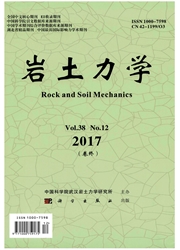

 中文摘要:
中文摘要:
目前针对堆石或土石坝的心墙水力劈裂问题虽然已取得了不少成果,但现有的成果大多从宏观的角度进行研究,对心墙水力劈裂发生机制的认识尚未达成一致的观点。采用颗粒流方法从细观角度对心墙水力劈裂问题进行初步研究,模拟了心墙水力劈裂发生和发展的过程。计算结果表明,劈裂水压力Pf随着竖向应力的增大而增大,且两者基本呈线性关系,与室内成果的规律基本一致;心墙在高水力梯度作用下,形成的水楔效应降低了裂缝尖端区附近的最大主应力,当该值小于或接近心墙上游的外水压力时则会导致水力劈裂的发生。此外,计算结果还证明了心墙发生水力劈裂的主要力学原因是由于心墙中的张拉应力超过了土体的抗拉强度。
 英文摘要:
英文摘要:
Recently, increasing attention has been given to hydraulic fracturing phenomena in core wall of rockfill or soil dams. However, most of the studies are carded out from the macro prospective, and the fracturing mechanism is still disputable. In this paper, the hydraulic fracturing problem is analyzed using the particle flow code (PFC) from the micro prospective. The occurrence and development of hydraulic fracturing is simulated. Results show that the fracturing pressure Pfincreases with the increasing of the vertical stress in an approximately linear way, which agrees well with experimental results. Under the high hydraulic gradient condition, the maximum principal stress near crack tip is decreased because of the wedge effect of water. Hydraulic fracturing will probably occur when the maximum principal stress is less than or close to the water pressure of upstream of core wall. In addition, it is also illustrated that the main reason of hydraulic fracturing in core wall is that the tension stress exceeds the tensile strength of the soil.
 同期刊论文项目
同期刊论文项目
 同项目期刊论文
同项目期刊论文
 期刊信息
期刊信息
